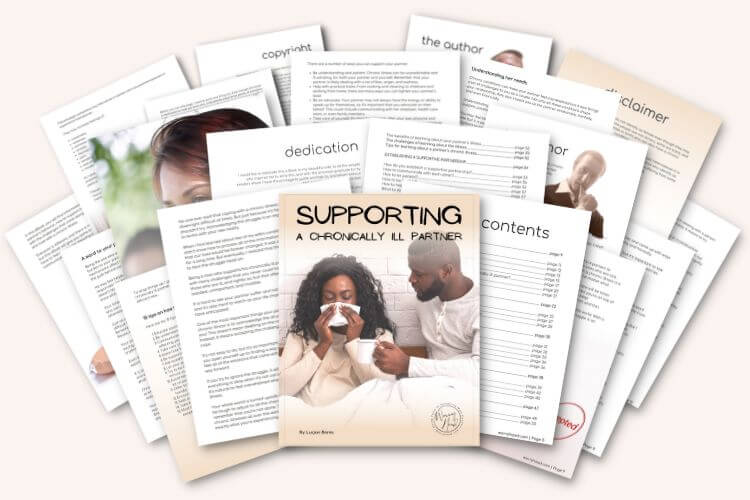Tips for males who care for females with chronic conditions.
Because my wife is fairly independent, I never considered myself her caregiver. It doesn’t mean, however, that I don’t play an important role in her care. This article is based on a decade of my personal experience of caring for someone with multimorbidity. I am going to share plenty of tips for males who care for females with chronic conditions.
Being a man who cares for his chronically ill wife, I have experienced firsthand some of the challenges that come with this role. My wife suffers from two chronic conditions, the first one is deep infiltrating endometriosis, and the second one is fibromyalgia disorder.
Both conditions caused her to develop general anxiety, panic attacks, Obsessive-Compulsive Disorder, and depression. The vast amount of conditions and disorders she suffers from made it extremely hard for her to keep her job. As a result, I became her primary source of support.
Although it is not easy, I have found ways to make our lives easier and more manageable. I would like to share some tips for males who care for females with chronic conditions.
Tips for males who care for females with chronic conditions.
The first and most important tip is to educate yourself about your partner’s conditions. It is important to understand what she is going through on a daily basis. What works for one person may not work for another, so it is important to be flexible and willing to try new things.
The second tip is to be patient, understanding, and supportive. This is not easy, but it is important. Your partner is going through a lot, and she needs your support.
The third tip is to be involved in her care. This means taking an active role in her medical appointments, helping her with medications, and being there for her when she needs you.
The fourth tip is to take care of yourself. This is important because if you are not healthy, you will not be able to take care of your partner. Make sure to eat right, exercise, and get enough rest.
The fifth tip is to ask for help when you need it. This can be from family, friends, or even professionals. Don’t be afraid to ask for help when you need it.
These are just a few tips for males who care for females with chronic conditions. It is not easy, but it is possible. With education, patience, support, and self-care, you can be a successful caregiver.
In the next paragraph, I share my unique 24 ways you can help your chronically ill partner.
If you want to learn how to cope with your partner’s chronic illness, how to support her struggles, and manage a relationship with a chronic condition, I give away a FREE Chapter of my eBook: “Supporting a Chronically Ill Partner”.
This chapter alone has all the comprehensive information about acknowledging the struggles, including:
- A word to your partner.
- A word to you.
- Stepping on eggshells.
- Understanding her needs.
- How to acknowledge having a chronically ill partner?
- Acknowledging can be hard.
- 15 tips on how to do it!
Get the 1st Chapter FREE!
Chronic Illness for Partners

24 ways to help a chronically ill person.
- Be her advocate. This means being her voice when she can’t speak for herself and fighting for her when she can’t fight for herself.
- Educate yourself about her conditions. This way you can better understand what she is going through and how you can help.
- Be patient and understanding. She is going through a lot, and she needs your support.
- Get involved in her care. This means taking an active role in her medical appointments, helping her with medications, and being there for her when she needs you.
- Take care of yourself. This is important because if you are not healthy, you will not be able to take care of your partner. Make sure to eat right, exercise, and get enough rest.
- Ask for help when you need it. This can be from family, friends, or even professionals. Don’t be afraid to ask for help when you need it.
- Make sure she has a support system. This can be in the form of family, friends, or even online support groups.
- Hep her with her finances. This may include budgeting, helping her find scholarships or grants, or even just helping her save money.
- Help her with household chores. This includes cooking, cleaning, laundry, and anything else she may need help with.
- Be there for her emotionally. This means listening to her, being supportive, and being a shoulder to cry on.
- Help her stay connected with friends and family. This can be done by sending emails or cards on her behalf, setting up video chats, or even just talking to her on the phone.
- Help her stay active and engaged. This includes helping her find activities she enjoys, taking walks with her, or even just sitting and talking with her.
- Make sure she eats healthy foods. This includes preparing meals for her, packing her a healthy lunch, or even just making sure she has healthy snacks available.
- Help her stay hydrated. This means bringing her water, juice, or Gatorade throughout the day, or even just making sure she has a water bottle with her at all times.
- Help her take her medications. This includes reminding her to take them, helping her fill her prescriptions, or even just keeping track of when she takes them.
- Help her stay on top of her medical appointments. This includes scheduling appointments for her, taking her to and from appointments, or even just sitting in on appointments with her.
- Help her with physical therapy. This includes helping her with exercises, taking her to and from appointments, or even just providing moral support.
- Help her with occupational therapy. This includes helping her with activities, taking her to and from appointments, or even just providing moral support.
- Help her find resources. This can be in the form of finding financial assistance, medical resources, or even just information on her condition.
- Help her deal with insurance companies. This includes helping her understand her policy, filing claims, or even just fighting for coverage of certain treatments.
- Help her deal with the side effects of her medications. This includes helping her manage fatigue, nausea, pain, or even just providing moral support.
- Help her deal with the emotional effects of her illness. This includes helping her manage anxiety and depression, or even just providing moral support.
- Be an advocate for her. This means being a voice for her when she is not able to speak up for herself, fighting for her rights, or even just speaking up in general about chronic illness.
- Help your partner cope with a chronic illness is to simply love her. This means supporting her unconditionally, being there for her no matter what, and loving her no matter what.
Male carers for females.
Male carers for females with chronic illness face many challenges. They must often cope with feelings of isolation, guilt, and anxiety. In addition, they must juggle the demands of caring for their partner with the demands of their own life.
Despite the challenges and the sacrifices they make, male carers play an important role in the lives of their chronically ill partners. They provide essential emotional and practical support. They are also often the main source of social support for their partner.
But even though men don’t seek out caregiving roles, they can still find themselves in the position of being a carer.
What’s rarely spoken of is that women are usually portrayed as those who care for the kids, sick and elderly. Men aren’t widely recognized as carers. In fact, it’s often assumed that men are incapable of caring or simply don’t want to do it.
This is why tips for males who care for females with chronic conditions are essential to have.
Men caring for chronically ill women aren’t taken seriously, furthermore, they are left to fend for themselves when it comes to tips and advice.
The societal norm is that women are the carers and men are the ones who go to work and earn the money. This is an outdated way of thinking that doesn’t take into account the changing nature of families and relationships. More and more men are finding themselves in the role of carer.
With that comes the need for understanding and support. Male carers for females with chronic conditions feel isolated and alone. They even feel marginalized because of their gender.
Men caring for chronically ill women are in a position where they are the primary source of support, but caring for their partner is not always easy because there is not enough information for male caregivers. If you are a man whose wife has a chronic illness, you may find yourself asking, “Where can I turn for help?”
This blog is one of the rare sources that focus on the man’s mindset and tips for dealing with a chronically ill woman.
I created Worry Head in particular aiming to educate men about endometriosis and fibromyalgia, so it’s only fair I discuss both conditions and discuss tips for males who care for females with endometriosis and tips for males who care for females with fibromyalgia.

Endometriosis caregivers.
Endometriosis caregivers are those who help with the day-to-day tasks and needs of someone with endometriosis. They may also provide emotional support and help with doctor’s appointments and other medical needs.
Endometriosis is a chronic, often painful condition that affects women of childbearing age. It occurs when the tissue that is similar to the one that lines the inside of the uterus grows outside of the uterus. This can cause inflammation, pain, and scarring.
There is no cure for endometriosis, but treatments can help manage the symptoms. Caregivers for women with endometriosis play an important role in helping them cope with the condition.
The tips for males who care for females with endometriosis are:
Understand her pain. Endometriosis is a chronic and often debilitating condition that can cause severe pain. As a caregiver, it’s important to try to understand what she’s going through. This can be difficult, as you can’t feel her pain yourself. However, it’s important to listen to her and offer support.
Be patient. Endometriosis can be unpredictable. Flares can come and go, and pain levels can vary day to day. As a caregiver, you need to be patient and understanding.
Help with household tasks. Many women with endometriosis find it difficult to keep up with household tasks. Offer to help out where you can. This may include cooking, cleaning, laundry, and grocery shopping.
Make sure she’s getting enough rest. Fatigue is a common symptom of endometriosis. Help her to get enough rest by taking on some of her responsibilities and offering to run errands for her.
Encourage her to exercise. Exercise can help to reduce pain and fatigue. It can also improve mental health. encourage your partner to exercise, even if it’s just a short walk around the block.
Educate yourself about endometriosis. The more you know about endometriosis, the better equipped you’ll be to support your partner. Read up on the condition and talk to her doctor if you have any questions.
Fibromyalgia caregivers.
Fibromyalgia caregivers are similar to those who care for women with endometriosis. They help them with tasks and needs. They also provide physical and emotional support.
Fibromyalgia is a chronic condition that causes widespread pain and fatigue. It can also cause mood swings, sleep problems, and memory issues. The mood swings can be mild or severe.
Fibromyalgia causes so-called “brain fog” which can make it hard to think clearly. It can also cause problems with memory and concentration.
The tips for males who care for females with fibromyalgia are:
- Listen to her: One of the best things you can do for a woman with fibromyalgia is to listen to her. This means really listening, without interrupting or trying to fix everything. Just let her vent and be there for her.
- Be patient: Women with fibromyalgia often have good days and bad days. Sometimes they’re in a lot of pain, and other times they feel relatively well. It’s important to be patient and understand that she can’t always predict how she’s going to feel from one day to the next.
- Help with household chores: Many women with fibromyalgia find it difficult to do everyday tasks like cleaning, cooking, and grocery shopping. If you can pitch in and help with these things, it will make a big difference.
- Exercise with her: Exercise is an important part of managing fibromyalgia, but it can be hard to motivate yourself to do it when you’re in pain. If you can exercise with your partner, it will help her stay on track.
- Be understanding: It’s important to remember that fibromyalgia is a real condition that can be very debilitating. It’s not “all in her head,” and she can’t just “snap out of it.” Showing understanding and compassion will go a long way.
Summarising supporting a chronically ill partner…
Supporting a chronically ill partner can be challenging itself. It is especially true for caregiving men. Caregiving by men can struggle with the expectations that are put on them.
It is formally approved that women care for the sick and elderly people, but men are often not seen in this light. This can put a strain on men when they are thrust into the role of caregiver. Such marginalization of men’s contribution to caregiving can result in immense stress.
There are tips for males who care for females with chronic conditions such as those I provided in this article, but it doesn’t take away the challenges that men face. These tips can help to make things a little easier, but ultimately it is up to the man himself to decide how he wants to handle the situation.
If you are a man who is caring for a chronically ill partner, remember that you are not alone. Talk to other men in similar situations and lean on them for support. And don’t be afraid to seek professional help if you are struggling to cope.
Lastly, let’s meet up and have a chat in the comments section below. Cheers!
Get the 1st Chapter FREE!
Chronic Illness for Partners



About Me
Hi, I’m Lucjan! The reason why I decided to create this blog was my beautiful wife, who experienced a lot of pain in life, but also the lack of information about endometriosis and fibromyalgia for men…
